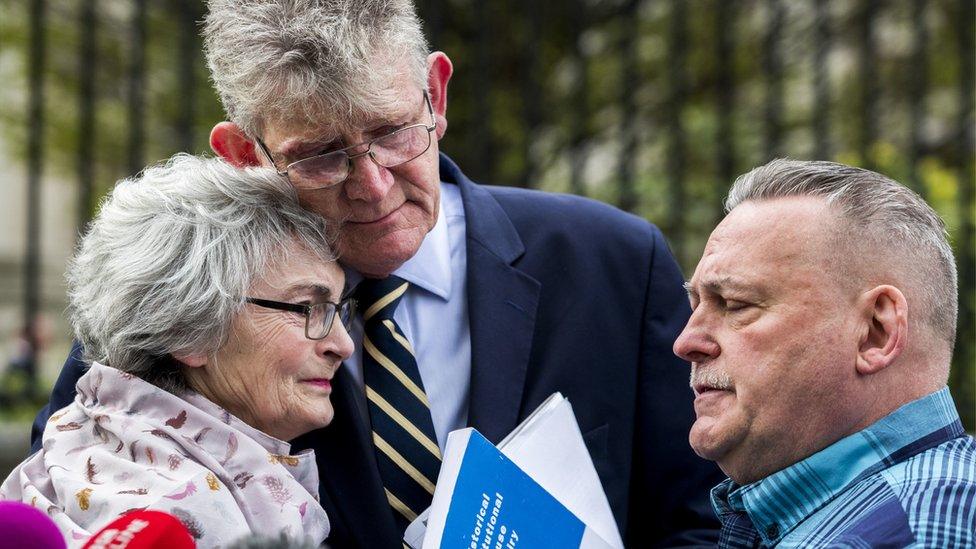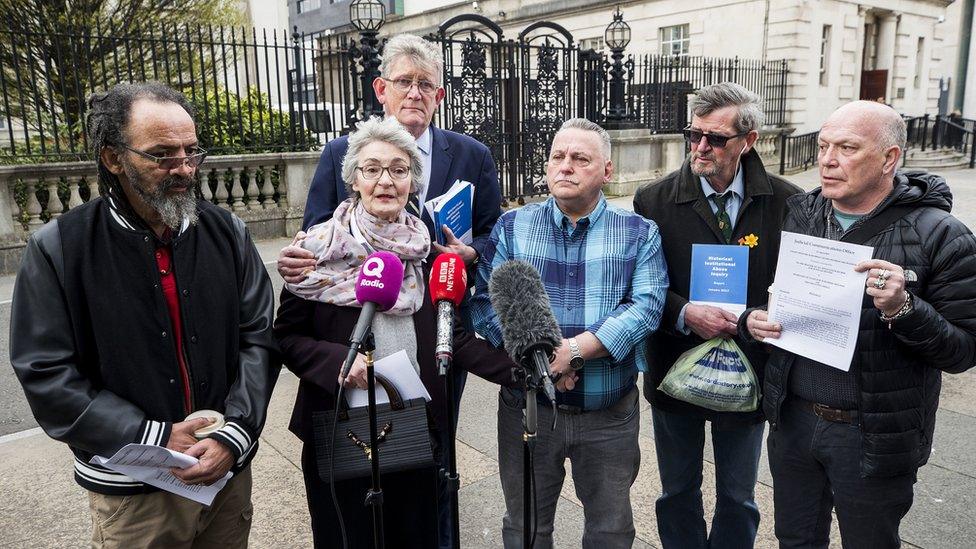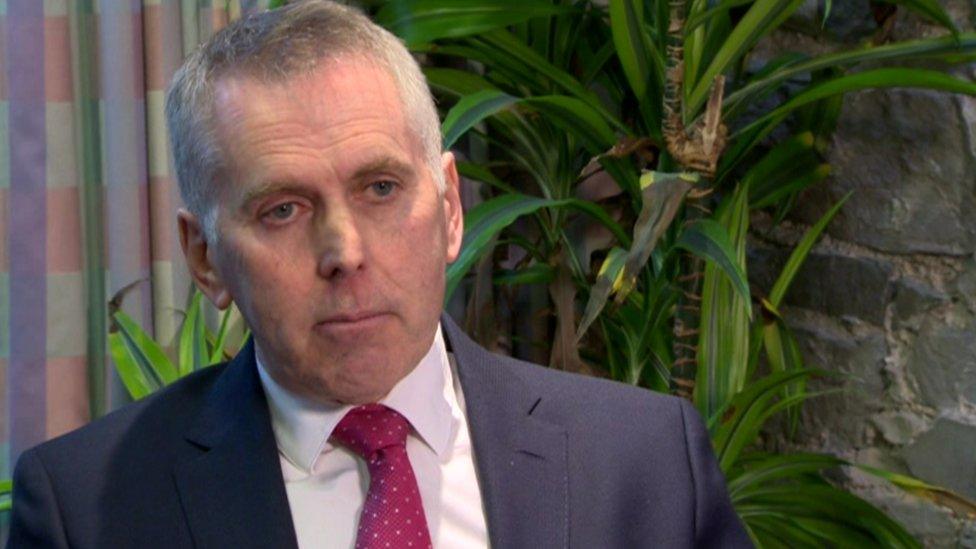Institutional abuse: SoS 'no obligation' to grant compensation
- Published

Jon McCourt (centre) said abuse survivors were angered by the judgement
Survivors of historical institutional abuse have failed in a legal High Court bid to have the Northern Ireland secretary ordered to introduce compensation payments.
Their lawyers argued that Karen Bradley has the authority and a legal duty to implement a recommended redress scheme.
The judge ruled there was no unlawful failure to act by either Mrs Bradley or Stormont's Executive Office.
Outside court, survivors said it was another devastating setback.
The Northern Ireland Office (NIO) and the Executive Office both said they had noted the judgement.
A spokesperson for the NIO added that it is "considering the findings carefully" and "will set out next steps in due course".
In January 2017, the Historical Institutional Abuse (HIA) Inquiry published a report recommending compensation ranging from £7,500 to £100,000 to those who suffered neglect and assaults.
The failure to enact the recommendations in the report has been repeatedly criticised.
Lord Chief Justice Declan Morgan said last year the failure to implement the HIA recommendations was "indicative of the real impact a lack of government in Northern Ireland has on the lives of local people".
With no functioning Northern Ireland Assembly since devolution collapsed in January 2017, the challenge was aimed at having the Northern Ireland secretary and the Executive Office compelled to take immediate steps on the payouts.
'One final chapter'
The judge said: "The governance vacuum in Northern Ireland does not infringe any principle of constitutional law."
The verdict is a blow for those fighting to secure the compensation envisaged in the major report into the abuse at children's homes run by religious orders and the state between 1922 and 1995.
Jon McCourt, the chairman of the Survivors North West group, said outside court that campaigners were "angry".
"This was a hope that the justice system would actually start to move forward for victims and survivors of historical institutional abuse," he added.
"There's a moral obligation as well as a legal obligation on the secretary of state to move this forward.
"This should have been done as soon as the executive collapsed - the secretary of state should have taken charge of this."

Kate McCausland spoke outside court about her mother Una Irvine, who was abused
However, it may not be the end of the case.
With the head of the Northern Ireland Civil Service set to ask Mrs Bradley to put draft legislation dealing with the redress proposals before Parliament, the judge signalled there could be "one final chapter" based on her response to that request.
Proceedings were brought by a man in his 70s, identified only as JR80, on behalf of other survivors of sexual, physical and psychological abuse and neglect.
The court heard that up to 30 people who suffered abuse have died since the report was issued.
'Dystopian nightmare'
Counsel for JR80 argued that the deaths were continuing amid a complete loss of democratic accountability and branches of government were "passing the parcel" over responsibility for implementing the redress scheme.
He told the court the survivors are enduring a "dystopian nightmare".
Details of the beatings and molestation suffered by JR80 were disclosed during the hearing.
In a statement he recalled being taken to a home when he was aged about seven.
"I was too young to know what was happening or why," he said.

The HIA Inquiry was set up to examine allegations of child abuse in children's homes
"I simply remember being out with my two brothers picking blackberries, being put in a car and taken to the home."
He was separated from his siblings and did not see them again during his time there, the court heard.
Repeated abuse
"Every day there felt like a year," JR80 stated.
He suffered repeated abuse, involving frequent assaults and witnessing even worse violence being inflicted on others.
Beatings were meted out for wetting the bed, according to his account, leaving him frightened to go to sleep every night.
He also described being sexually abused by a man who came to the home.
"I found separation from my brothers unbearable, I didn't know where they were and missed them terribly," he added.
When he finally left the home and was reunited with his brothers they never discussed what had happened to them.
Vacuum in governance
JR80's barrister insisted that countless other children were allowed by the state to suffer a similar fate.
Lawyers representing the Northern Ireland secretary and the Executive Office argued that they had no power or legal obligation to intervene.
Dismissing the challenge, the judge described the protracted vacuum in governance in Northern Ireland as a disadvantage to the population rather than an infringement of any constitutional principle.
He added: "Absent legislative intervention by the United Kingdom government... permit the moratorium, which has afflicted this state for some two years."
"The plight of the victims and survivors of historical institutional abuse in Northern Ireland illustrates graphically just how damaging this is for certain sections of society."
- Published2 April 2019

- Published1 April 2019

- Published13 February 2019

- Published5 September 2018
